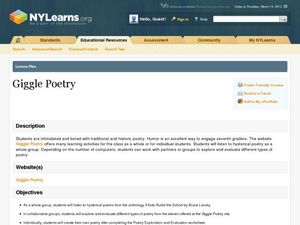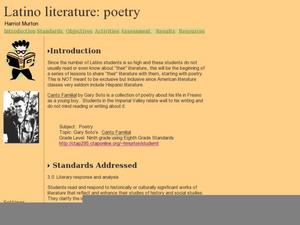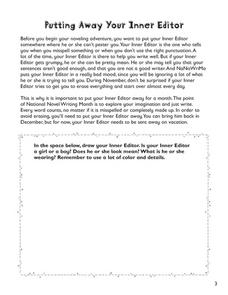Curated OER
Are You Aware?
In this reading comprehension worksheet, students read several short paragraphs about farm animals and then answer five multiple questions about each paragraph.
Curated OER
Jabberwocky-Identifying Adjectives
Elementary learners identify adjectives in sentences. They read the poem "Jabberwocky" by Lewis Carroll and highlight the adjectives. A good supplemental lesson if you are studying Lewis Carroll and/or "Jabberwocky."
Curated OER
Style and Voice
Develop the writing skills of your high school class. Writers consider their personal style and voice, read selections by other authors, and then write pieces that challenge them to experiment with their own style.
Curated OER
Holes: Setting and Inferences
Learners read the book Holes, and draw a picture of the setting and answer questions about inferences regarding the book. They answer two questions and draw one setting.
Curated OER
Childhood Feelings
Student explore feelings, how to deal with them and how to express feelings. For this feelings lesson, students discuss different ways they feel. Students sing songs about feelings and show actions for each feeling.
Curated OER
United States Quiz 3
For this United States worksheet, students answer short answer questions about the geography and holidays of the United States. Students complete 10 short answer questions.
Curated OER
On the Scene: Analyzing Scenes in Film and Literature
Students examine how a scene in a movie or in literature is constructed. In this film and literature lesson students answer questions based on film clips then create storyboards depicting a scene from their life.
Curated OER
Writing Process-- Revision and Editing
As guided practice, class members work together to revise a model persuasive paragraph. Then they practice independently with their own writing. The included rubric looks at prewriting, drafting, revising, editing, nonfiction text...
Curated OER
Irony in Poetry and Prose (Fiction and Non-fiction Texts)
Middle and high schoolers examine the impact of irony in poetry and prose. In this figurative language lesson, they read instructor-selected literature and identify uses of irony. Then they discuss how irony enhances literature.
Curated OER
Giggle Poetry
Poetry can be fun! To set your pupils giggling, have them listen to poems from If Kids Ruled the School by Bruce Lansky. Then, they can study the different types of poetry on www.gigglepoetry.com, and choose one form on which to...
Curated OER
Hillbilly Feud:Language Arts Game
English language learners or native elementary schoolers will enjoy practicing their parts of speech with this interactive grammar game. Set deep in the backwoods of Tennessee, the class splits in two to join either the Hartfields...
Curated OER
Selecting Ribbons and Tying Bows
Much detail about the types, effectiveness, and use of ribbon is given in this flower arranging presentation. The common sizes for different occasions and styles of floral arrangements are given, and there is some information about...
Curated OER
Fairy Tale Similes
Discuss similes in fairy tales using a simple worksheet. Learners take a look at the fairy tales they have read, talk about the definition of a simile, and list examples. Then, they create an illustration for one of the similes they have...
Curated OER
Reading With Fluency And Expression
Practice makes perfect, and this lesson provides a rubric to prove it! To improve their ability to read with fluency and expression, readers listen to a series of online stories in order to hear how a well-read story should sound. They...
Curated OER
Latino Literature: Poetry
Under construction, this lesson focuses on Canto Familia, a collection of poetry about Gary Soto's experiences growing up in California's Imperial Valley. Representative of the experiences of many Latinos, the poems also address themes...
Curated OER
Do You Have a Blog?
Ask learners about their personal writing habits, such as whether they keep a journal or a blog, or if they'd ever want to. Though this is not a fully developed lesson, you can use this article and question to provoke discussion and...
Curated OER
Literary Techniques
Need to review literary terms/techniques with your class? The slides in this presentation define and give examples of 22 common literary terms. The PowerPoint could be used for AP test prep.
Curated OER
Putting Away Your Inner Editor
Personify your Inner Editor. After making a richly detailed paper doll of your Inner Editor, put him or her in your locker, under your bed or buried in a time capsule in your backyard, but not near where you like to write. Refuse to...
Curated OER
Narrative Peer Editing Worksheet
Need a template for a narrative peer editing worksheet? Reviewers use this worksheet to record their responses to a classmate’s story, commenting on the effectiveness of the story’s introduction, conflict, character development, etc.
Curated OER
Diction: Formal and Informal Language
Coke or Pepsi? Is it the taste or the advertising that determines preference? As part of a study of diction, class members examine two passages, one formal and one informal, about Coca-Cola and Pepsi. In addition, they consider word...
Curated OER
Drama Terms Notes
Comedy, tragedy, act, scene, prop. do you want to review important drama terms? Actors record the term next to its definition on a worksheet that could be used individually or as a group activity. A link to a corresponding PowerPoint...
Curated OER
Importance of American Flag in American Literature
Betsy Ross - fact and myth. As an introduction to American Literature, class members become detectives and search web sites to find information about the flag, prominent places it has been displayed (on the moon, at ground zero, in...
Curated OER
Catcher in the Rye: Chapters 18-20 Venn Diagram
Well into Catcher in the Rye, when things are looking bleak and your readers may be needing some levity, read the picture book The Perfect Square by Michael Hall. Then use the Venn diagram included to compare how Holden Caulfield and the...
Curated OER
Out of the Dust: Questioning Strategies
Bloom's Taxonomy is a great way to address the many levels of comprehension. With explanations and examples of each level, you can create questions that focus on knowledge, comprehension, application, analysis, synthesis, and evaluation.























